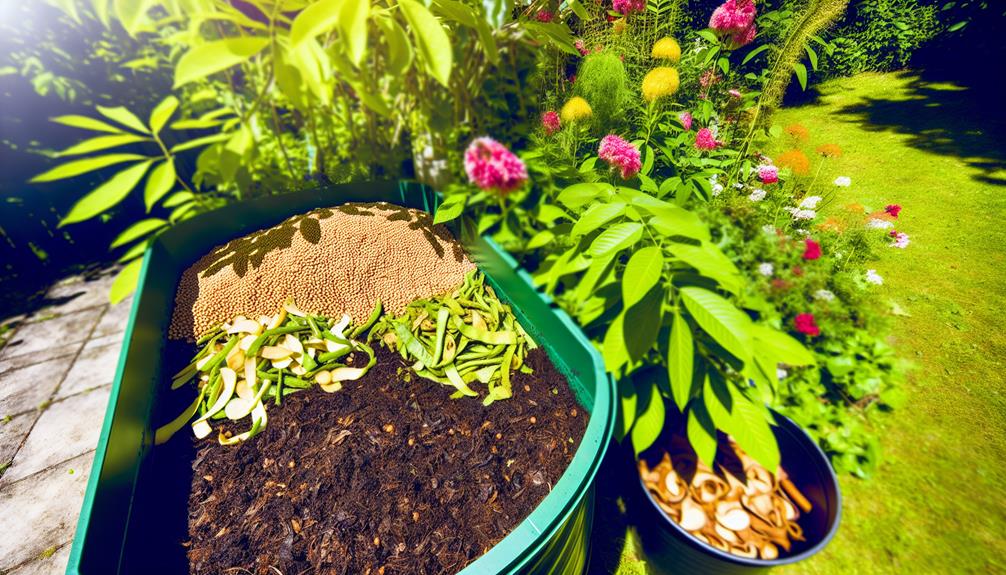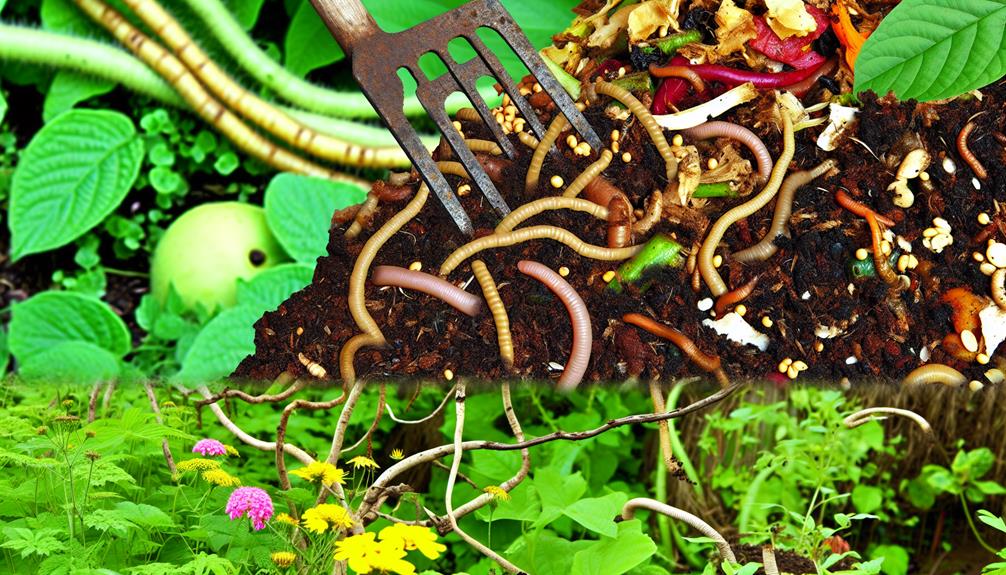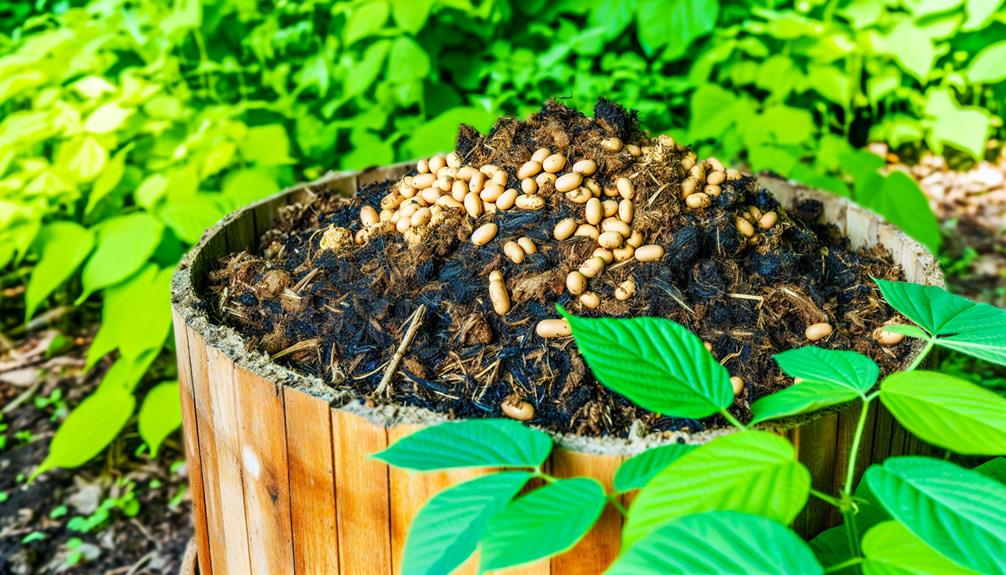

Yes, you can compost uncooked soy beans to boost your soil with essential nutrients, particularly nitrogen. Chop them into smaller pieces to speed up decomposition. Mix with a balanced ratio of green and brown materials, maintaining moisture similar to a damp sponge. Turn the pile regularly for proper aeration.
Be aware of potential challenges like slow decomposition and pests; chopping soybeans finely and covering the compost can mitigate these issues. Keep an eye on moisture levels to prevent mold and odors. This way, you’ll maximize the benefit of composting uncooked soybeans and create nutrient-rich compost for your garden. Continue for more tips.
Composting uncooked soybeans can greatly enrich your soil with essential nutrients. When you decide to add soybeans to your compost pile, you’re not just getting rid of waste; you’re contributing to soil enrichment in a significant way. Soybeans are rich in nitrogen, which is an essential element for plant growth. By composting them, you transform what could be waste into a valuable resource for your garden.
To start, collect your uncooked soybeans and mix them into your compost heap. You’ll want to balance them with carbon-rich materials like dry leaves or straw. This mixture helps maintain the right composting conditions, ensuring a quicker breakdown and better nutrient availability.
Understanding how nutrients break down in compost is essential for optimizing its benefits for your garden. When you add uncooked soybeans to your compost pile, you’re adding valuable organic matter that enhances the nutrient content of your compost. The decomposition process breaks down the soybeans, along with other organic materials, into simpler compounds that plants can easily absorb.
During decomposition, microorganisms like bacteria and fungi play an important role. They consume the organic matter, breaking it down into carbon dioxide, water, and nutrient-rich humus. This humus contains essential nutrients like nitrogen, phosphorus, and potassium, which are crucial for plant growth.
To maintain a balanced nutrient breakdown, keep the right mix of green and brown materials in your compost pile. Green materials, like soybeans, provide nitrogen, while brown materials, such as leaves and straw, supply carbon. This balance supports the microbial activity necessary for effective decomposition.
Turn your compost pile regularly to aerate it and speed up the decomposition process. Proper aeration helps the microorganisms thrive and ensures even breakdown of the organic matter.
Also Read: Can You Compost Body Wash?
To successfully compost uncooked soybeans, start by chopping them into smaller pieces to speed up the decomposition process. This will help create more surface area for microbes to work on, ensuring a smoother composting process.

Here are four steps to follow:
Despite following the steps meticulously, you may still encounter a few challenges when composting uncooked soybeans. One common issue is the decomposition rate. Soybeans can take longer to break down compared to other organic materials. To address this, try chopping the soybeans into smaller pieces before adding them to your compost. This increases the surface area, helping microbes work more efficiently.
Another challenge is pest control. Uncooked soybeans can attract rodents and insects, which might disrupt your composting process. To prevent this, make sure your compost is well-mixed and balanced with green and brown materials. Covering the compost pile with a layer of soil or brown materials like leaves or straw can also help deter pests.
Maintaining proper moisture levels is essential, too. Soybeans need a moist environment to decompose effectively, but too much moisture can lead to mold and unpleasant odors. Regularly check the moisture level and adjust as needed. Aim for a consistency similar to a damp sponge.
Also Read: Can You Compost Blood?
Incorporating uncooked soybeans into your compost can greatly boost its nitrogen content, enriching your soil. This process isn’t only beneficial for your garden but also a step toward sustainable practices. By adding soybeans, you’re providing a valuable resource that can help your plants thrive.

Here’s how to get started:
Yes, uncooked soybeans can attract pests to your compost pile. Use pest deterrents like citrus peels or coffee grounds. Implement pest control measures such as turning the pile regularly to keep your compost community-friendly.
Uncooked soybeans take several months to decompose, depending on decomposition factors like temperature and moisture. Use effective composting techniques—turning your pile regularly and balancing green and brown materials—to speed up the process and feel part of the eco-friendly community.
Yes, your plants will love the soybean compost! Legumes, in particular, benefit from the soil enrichment and nitrogen fixation. By using soybean compost, you’re fostering a thriving garden community that’s both healthy and sustainable.
Composting soybeans can impact the pH level of the soil. You’ll enhance nutrient balance and boost microbial activity, creating a thriving community for your plants. Just monitor pH to make sure it stays within ideal ranges.
You don’t need to worry about GMO concerns when composting soybeans. The environmental impact of composting genetically modified soybeans is minimal, and you’ll be contributing to a sustainable practice that benefits your community and garden.
Composting uncooked soybeans is a straightforward process that offers numerous benefits. By following the outlined steps, you can enrich your compost with valuable nutrients.
Remember to maintain a balanced mix of green and brown materials, and be mindful of moisture levels to avoid mold.
Should challenges arise, such as pests or odor, address them promptly with the provided solutions.
With proper care, soybeans can greatly enhance your compost, promoting healthier garden soil.
